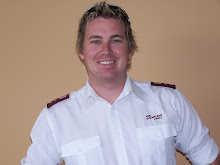Have you seen the movie Gladiator, it surely has to rate as one of the epic movies of the century so far. After Maximus, played by Russel Crowe, leads his band of gladiators to victory in a huge battle at the colosseum before the emperor, he is asked by the emperor what his name is. At first he replies flatly; “I am gladiator.” After being pressed for a more accurate description of who he his, Maximus replies: “I am Maximus Decimus Meridus, commander of the armies of the north, general of the Felix Legions, loyal servant to the true emperor Marcus Aurelius, father to a murdered son, husband to a murdered wife and I will have my vengeance in this life or the next”
Maximus describes himself first by what he did, what his job was, then by who he served then by what he had lost and finally by what he was going to do.
I wonder, how would you define yourself?
Who do you tell people you are?
What in your life defines who you are?
It seems today that many people are facing a crisis of identity. It seems that sometimes we don’t exactly know who we are. You hear of people needing to take time off to find themselves, as if they have misplaced their identity somewhere.
What would happen to you if what you said defined who you are as a person changed or was taken away?
Would you still know who you are?
Have you seen the movie wanted? In Wanted, we are introduced to Wesley. Now, Wesley is a nice enough sort of bloke, he is working as an accounts manager at a large company, and to be honest, he could be a lot happier.
Wesley’s life is far from what he imagined it would be. His girlfriend is cheating on him with his best mate, his boss is a tyrant, he suffers from debilitating panic attacks that require constant medication to control and truth be told, there is actually very little anywhere that Wesley really cares about at all.
But one night everything changes.
While picking up a few things from the corner shop, Wesley meets Fox, a member of the Fraternity, a group of elite assassins, working undercover in the world around him. Fox introduces Wesley to Frost, the soft spoken, wise leader of the fraternity, who reveals to Wesley that his father, the man who abandoned he and his mother while he was still a baby, was also a member of the Fraternity.
That is, until he was killed just days previous to their encounter by a rogue assasin. Wesley is recruited into the Fraternity and begins his training in order to find the killer of his father.
Part of the training Wesley under goes, requires him to understand why he is where he is, and why he is doing what he is doing.
It is during one of his sessions of self-discovery that Wesley reaches his breaking point and cries out: “I don’t know who I am!!!”
It is here that Frost takes Wesley back to his room, and tells him that the room, was in fact, his father’s room. Frost tells Wesley: “Everything in this room, books, weapons, clothes, belonged to him, now they belong to you. Find a connection in this room Wesley. It may be the only way of finding out who you are.”
Wesley felt lost, he didn’t really know who or what he was. Wesley needed to discover who he was. And in order to know the who and what of his existence, it was important for him to find a connection to who his father was.
In the Bible we find another man, Paul, a man who had once hunted down and persecuted Christians until experiencing a radically life changing meeting with Jesus Christ Himself, writes and tells us: “For even if there are so-called gods, whether in heaven or on earth (as indeed there are many "gods" and many "lords"), yet for us there is but one God, the Father, from whom all things came and for whom we live; and there is but one Lord, Jesus Christ, through whom all things came and through whom we live. (1 Corinthians 8:5-6 New International Version)
Today, we can identify ourselves by so many different titles and labels. Who we are can get so wrapped up in what we wear, how we look or what we do, that when this is taken away from us we can sometimes lose our own sense of identity, we lose who we feel we are.
In this passage of the Bible Paul talks about how there are different gods and lords in heaven and on earth. I want to suggest that these gods and lords might be the things that we use to define who we are, the things that we have decided to let define the purpose of our lives.
The problem is, that false gods and false lords, idols, the identities we create for ourselves, like the identity Maximus the one time general, and now gladiator searching for vengeance, created, can never be relied upon to help us or define us when we need to truly know who we are.
When these false gods and lords, these temporary things that we use to determine our identity and purpose cease to do that, we are left searching for who we are, searching for the real God and the real Lord in whom our real identity and our real purpose for living is found.
In the bible Paul tells us that God is our Father, that everything has come from Him and that He is the purpose of our lives, and that Jesus Christ is our Lord, who makes all things possible, and is the reason we have life.
Just like Wesley needed to find a connection to his father in order to discover who he was, we need to find a connection to God the father to discover who we are. When we find that connection to God the Father we discover who it was that created us and whose image we were created in.
Upon discovering our Creator and that we have been created in His image, we are able to discover the purpose of our creation. If we bear the image of God as a result of our creation, then it stands to reason that our purpose can be found in the image of He who has created us.
We are told in the Bible that God is love. So, if God, our creator, loves us unconditionally, then surely part of our purpose is to love God unconditionally, and also to love others in the same unconditional way that God loves them.
If God, whose very image we are created in, cares passionately about the poor and the marginalised and the oppressed, then surely part of our purpose is to care passionately about those who are poor and marginalised and oppressed. If God wants to see the whole world reconciled not only to Himself, but to each other also, then surely part of our purpose is to make possible reconciliation between not only us and God, but between each other.
In fact, God has already made the reconciliation process between Him and us and others easier.
Through Jesus’ death and resurrection God began the process of reconciling the world to Him and to each other. It is through Jesus Christ crucified and resurrected that we find life, a life in abundance. If God gives us our source and purpose, then it is Jesus who makes it possible for us to live and fulfil our purpose abundantly.
Jesus’ teaching is so counter intuitive to all that the world tells us is logical. Who would ever believe that the best way to find out who we are is to abandon our search for self completely and search for God instead?
And the thing is, that no search for God ever goes unfulfilled. God has promised us that when we search for Him with all of our heart we will be able to find Him. Irrespective of who we are, what we are doing or the circumstances that we find our selves in, God has promised to reveal Himself to us when we look for Him with all of our effort.
When we stop trying to define who and what we are by what we own or do or look like and begin to define ourselves by whose we are and what His purpose is, then we can truly find ourselves and the meaning of our lives.



